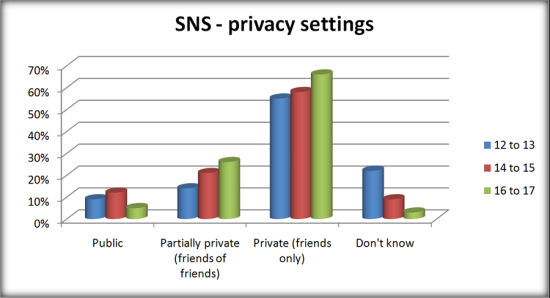Recent research from the Australian Communications and media Authority (ACMA) shows a much higher level of privacy awareness than is popularly assumed.
"The majority of 12 to17-year-olds are setting their social networking profiles to private and the proportion who are doing so increases with age," said ACMA Deputy Chairman, Richard Bean.
"Young people are taking steps to protect their privacy like using privacy settings, deleting tags and comments as well as thinking twice before posting things they may regret."
The survey was based on a large number (n=604 eight to 11-year-olds and n=907 12 to 17-year-olds) of one-on-one and group interviews conducted in June 2012. This initial report is part of a much wider-ranging analysis ('Like, post, share—Young Australians experience of social media') to be released later this year.
|
|

According to ACMA, some of the more significant findings are:
• Seventy per cent of eight to nine year olds have not posted any personal information online
• Fifty eight per cent of 14 to 15-year-olds have their profiles fully private; and a further 21 per cent are partially private
• Sixty six per cent of 16 to 17-year-olds have their profiles set to fully private, with a further 26 per cent partially private
• The use of private messaging is becoming increasingly commonplace, especially among older teens, with 89 per cent of 16-17 year olds surveyed reporting they had sent private messages in the last four weeks.
'Even the youngest internet users need to be aware of the potential impact of not managing their online privacy, now and as they grow up,' Richard Bean added.
'It is important we take this message to all young people.'
The report also reiterates ten major cybersmart tips to protect online privacy.
The ten most important tips are...
1. Limit your friend list to people you do know—don't 'friend' random people.
2. Sharing passwords is not a good idea—unless it's with a trusted adult like your Mum or Dad.
3. Double-check your privacy settings—make sure that the information you share is only seen by the people you want to see it.
4. Protect your digital reputation—think before you post, chat, upload or download.
5. Don't use a web cam with strangers.
|
7. Be very careful about checking in from your mobile phone—this lets people know where you are, what you're doing and where you have or haven't been.
8. Check that you're not also displaying your location details to those nearby who you might not know.
9. If you feel unsafe while you're at a particular location, contact the police, and if you have problems while using a service, report it to the service provider
10. Apply the same rules to the stuff you post about your friends—make sure you check with them before you tag them in photos or check them to a location.
All good advice, and probably of value to the grown-ups in the room too!








































